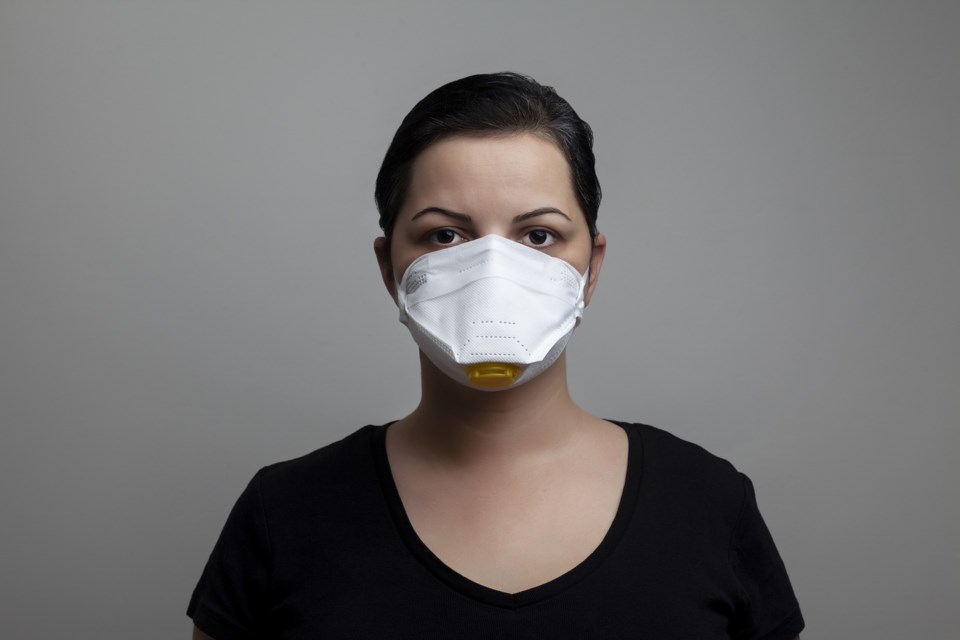Brooklyn
As of Monday, January 10 the 7-day positivity rate for COVID-19 is 12.5% in Brooklyn, down from 19.8% one week ago. The figures show that while Brooklyn and New York City as a whole are still battling a surge in COVID cases brought on by the new Omicron variant, we may have reached the peak of that surge.
Meanwhile, some neighborhoods in the borough are returning positive COVID-19 tests at rates far above the average, including East New York/Cypress Hill's 11208 ZIP code where the 7-day positivity rate is 23.54%.
Bushwick/East Williamsburg’s 11237 ZIP code, which has the highest positivity rate of our Brooklyn neighborhoods last week at 34.49%, has dropped to a transmission rate of 19.01%.
On Tuesday, the Biden administration launched its new website allowing people to order up to four free at-home coronavirus tests, and demand is significant, The New York Times reports. The federal website says the tests will be shipped within 7 to 12 days of ordering.
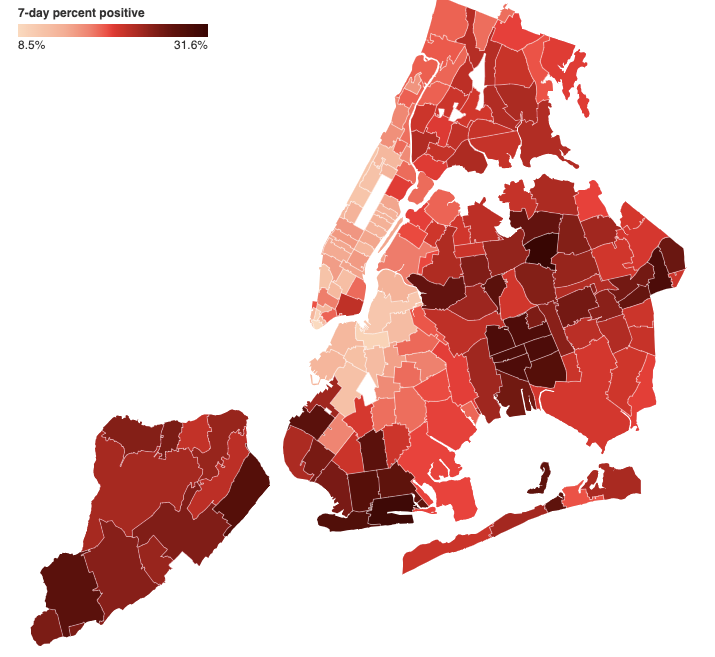
There have been 633,401 confirmed COVID-19 cases in Brooklyn and more than 11,600 deaths, according to The City’s COVID-19 tracker.
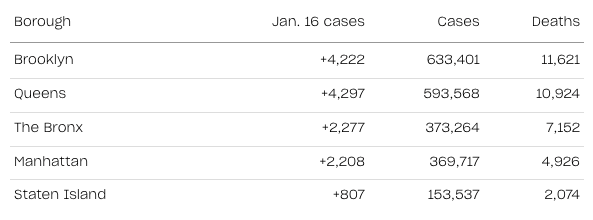
Brooklyn Borough President Antonio Reynoso has been hosting mask and COVID-19 test handouts across the borough over the past two weeks, and on Wednesday, Jan. 19 will hold one in Williamsburg.
Despite high COVID-19 numbers, students in Brooklyn and across the city are back at school this week, despite some resistance from teachers and parents, and soaring absentee rates. Newly sworn-in Mayor Eric Adams is adamant schools must stay in person, but has said schools are looking at a remote option for students isolating due to COVID-19 exposure or illness, NBC reports. However, he says that option will only be available to those students isolating and not those choosing to stay home from school.
Adams said the city’s enhanced testing program for schools, which includes at-home tests to limit quarantines and doubles the number of students and staff randomly tested each week, will keep students, staff and families, while also putting an end to disruptions in the classrooms.
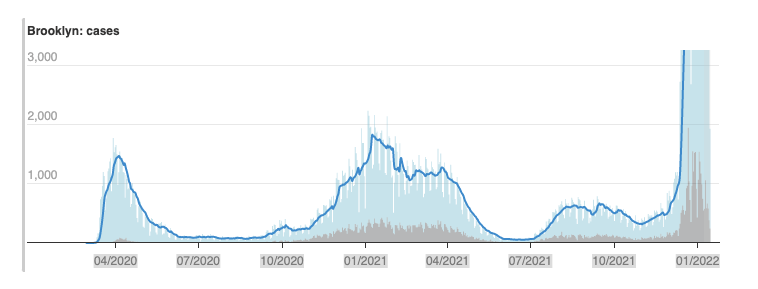
A number of the borough’s hospitals are reaching capacity in their ICU wards as caseloads rise. Woodhull is reporting 100% capacity, up from 99% seven days ago; Interfaith Medical Center is at 100%, up from 99% last Monday; NewYork-Presbyterian Brooklyn Methodist is at 90% up from 89%, Brookdale Hospital Medical Center is at 96% up from 87% and Kings County Hospital Center is at 85% up from 80%, according to The New York Times.
As of Jan. 3, 67% of eligible Brooklyn residents are fully vaccinated. To find a vaccination site near you, click here.
NYC
On Jan. 17 there were 24,906 new COVID-19 cases reported in NYC, down from 40,526 new cases just seven days earlier — a 36% decrease over the past two weeks, The New York Times reports. Although positive case numbers are slowing down, there has been an increase in patients hospitalized by COVID-19 and an increase in COVID-19 deaths.

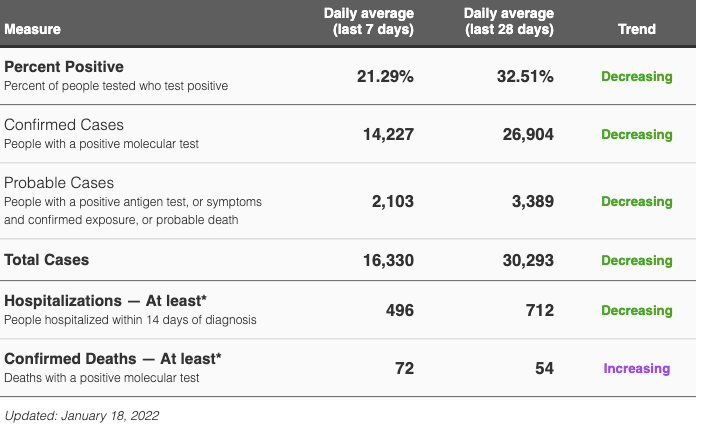
The City is continuing to urge New Yorkers to get tested for COVID-19 and to get caught up on their latest vaccine dose, and is also urging New Yorkers to invest in high-quality masks after saying that fabric masks no longer make the grade.
The Centers for Disease Control and Prevention said last week that cloth masks do not offer as much protection as surgical masks or respirators. It said well-fitting disposable surgical masks and KN95s are more protective than all cloth masks, and well-fitting respirators, including N95s, offer the highest level of protection, according to The New York Times.
The agency urged Americans to “wear the most protective mask you can that fits well and that you will wear consistently.”
The City has increased capacity at its COVID-19 testing sites, establishing new sites and increasing availability of at-home rapid result tests to meet demand for COVID-19 tests. To find a testing site near you, click here.
New York State
As of Jan. 18, the daily positivity average for New York State was 15.04%, down from 21.71% seven days earlier, according to state data. 11,928 New Yorkers were hospitalized with COVID-19 on Jan. 17, up from 11,747 a week earlier.
Governor Kathy Hochul said that as numbers continued to move in the right direction, "we need to remain vigilant against the winter surge by getting the vaccine and boosters, continuing to use masks, and staying home if you feel sick, so we can keep our fellow New Yorkers safe."
"Let's not undo all of the progress we've made," she said. "We hope to close the books on this winter surge soon, so we can turn the page and open the book on our 2023 budget outlook and focus on the post pandemic future."
On Tuesday, Hochul released her financial year 2023 budget, which includes $1 billion to fund innovative small businesses and tax credits for COVID-19 related expenses.
"We have the means to immediately respond to the COVID-19 pandemic as well as embrace this once-in-a-generation opportunity for the future with a historic level of funding that is both socially responsible and fiscally prudent," Hochul said.
"As I said in my State of the State speech: It's time for a better, fairer, and more inclusive version of the American Dream. I'm calling it the New York Dream. We will make that New York Dream real - and ensure that it can be realized by every single New Yorker."
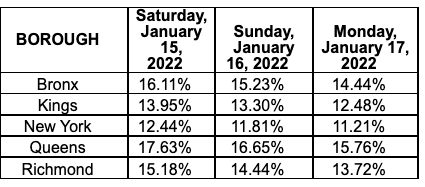
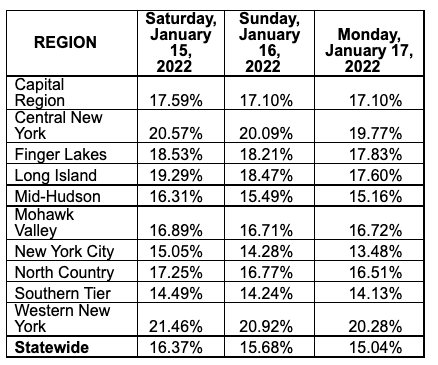
Hochul recently announced a first-in-the-nation booster requirement for health care workers, and said more information would be coming soon. She also announced new requirements for nursing home visitors, with the aim of keeping visitors and residents safe. Visitors must now wear “surgical”-type masks and have a negative COVID test within 24 hours of visiting.
According to the CDC as of Jan. 18, 73% of eligible New Yorkers are fully vaccinated. The state has partnered with local health departments and community partners to launch over 40 new pop-up vaccination sites across the state. Learn more and find a pop-up site.
Hochul said for those wondering how long to wait to get a COVID-19 vaccine after having the virus, the CDC advised that those who had recovered from their illness, met the criteria for discontinuing isolation and were without symptoms could be vaccinated.
She added that new guidance recommended booster doses for all New Yorkers ages 12 and older. The guidance, following action by the CDC, recommends that people, including the newly authorized 12-15 year-old age group, who received the Pfizer-BioNTech vaccine should receive a booster dose at least five months after their second dose; the previous recommended interval was at least six months.
In addition, moderately to severely immunocompromised 5-11-year-olds can receive an additional primary dose of the Pfizer-BioNTech vaccine 28 days after their second dose. At this time, only the Pfizer-BioNTech COVID-19 vaccine is authorized and recommended for children ages 5-11.
All state mass vaccination sites are now offering Pfizer COVID-19 vaccine booster doses for New Yorkers 12 years of age and older, as well as third doses for immunocompromised people 5 years and older. For more information on boosters and additional doses, see the State’s dedicated page here.

